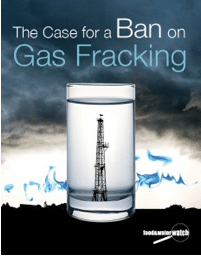Last month, DeSmogBlog released Fracking the Future, an in-depth report on the threats posed by unconventional gas drilling and the efforts of the gas industry to limit state and federal oversight of the process. A review of independent scientific research showed that under no conditions can unconventional gas drilling be considered safe, nor can the oil and gas industry’s army of PR front groups and apolgists be trusted to give an accurate portrayal of the true risks associated with the fracked gas boom.
The report concluded that current state oversight is inadequate to hold the rapidly growing gas industry accountable and, given the dangers associated with unconventional gas production, an immediate moratorium on hydraulic fracturing is necessary and overdue.
In its new report, the nonprofit Food and Water Watch renewed these claims, calling for a reinstatement of federal statutes like the Safe Drinking Water Act and the Clean Air Act over unconventional drilling and, more forcefully, calling for a nationwide fracking ban.
Entitled The Case for a Ban on Gas Fracking, the new report details the rapid growth of the risky unconventional gas fracking frenzy gaining momentum across the U.S. In the four-year span from 2004 to 2008, gas wells in America increased by 41 percent, to over 52,000. This steady increase of drilling across the country is accompanied by an unsettling encroachment of gas wells into residential areas. The report cites Pennsylvania as an example, where over 3000 unconventional wells and future well sites sit within two miles of 320 day care centers, 67 schools, and 9 hospitals.
The report finds that despite industry suggestions to the contrary, fracking is inherently dangerous. The opportunity for irreparable damage to drinking water supplies, air quality and human health presents itself at nearly every stage of the process.
Food and Water Watch catalogues numerous well-documented instances of air pollution, water contamination and negative effects on human health due to fracking operations. Some of the worst dangers are associated with the heavy chemicals used throughout the process and toxic wastewater, which post-fracking is laced with additional toxic contaminants from the underlying rock. The report details how nearly no water treatment facilities can cope with the billions of gallons of wastes produced in the process.
Compounding the hazards associated with fracking are the underfunded, overextended and often industry-friendly state enforcement agencies. Even where existing laws were updated to more effectively reflect the risks associated with unconventional drilling, there is little to indicate that state regulators are prepared to monitor and enforce these laws adequately.
States stand to profit too much by maintaining the current backslapping culture of industry appeasement. The report draws on the connection between state revenue and insufficient regulation. In Pennsylvania, for example, where $1.1 billion in gas drilling related revenue accrued between 2006 and 2011, officials are twice as likely to issue warnings than impose fines. Officials often have the conflicted responsibility of both fostering and moderating the industry.
Beyond the state level, there is significant pressure to limit federal oversight. Although a growing consensus is rallying for the restoration of federal environmental statutes like the Safe Drinking Water Act and the Clean Air Act over unconventional drilling, little progress has been made on this issue. The report outlines how industry lobbying has steadily increased, combatting measures to protect public health and safety. The fracking moratorium in New York, for example, has caused a surge of lobbying activity, over $1.2 million dollars worth in 2010 alone.
Despite the reticence of lawmakers on the issue, Food and Water Watch lists ten studies and investigations from the last 18 months, each of which point to the dangers associated with fracking, especially to human health, and the inability of officials to capably monitor the process. While officials levied several injunctions against drilling companies, the report notes that because of weak oversight, nearby communities remain vulnerable.
The rush to produce unconventional gas is putting the public at an unacceptable risk, the report concludes. A nationwide ban on fracking is the only measure that can truly secure public air and water against industry contamination.
Read the full report, The Case for a Ban on Gas Fracking.
Subscribe to our newsletter
Stay up to date with DeSmog news and alerts







